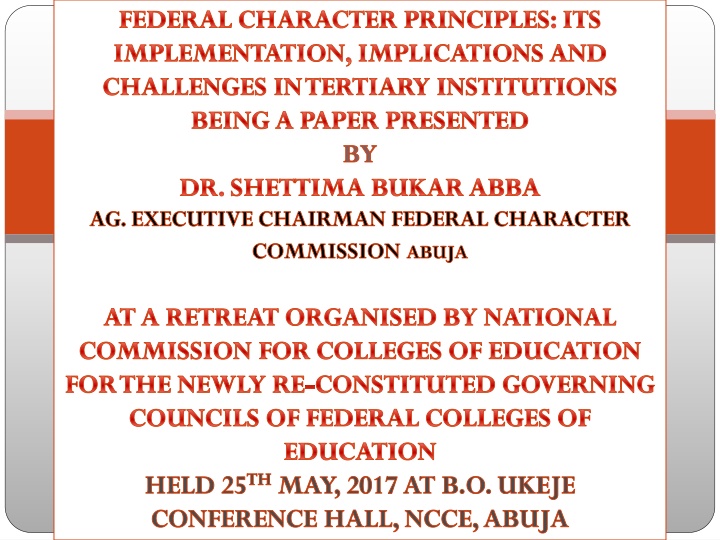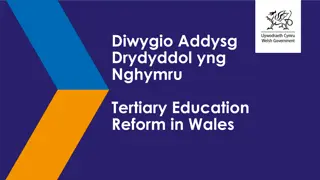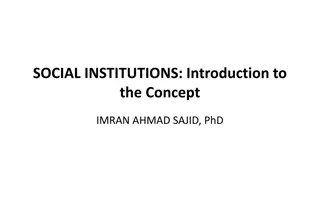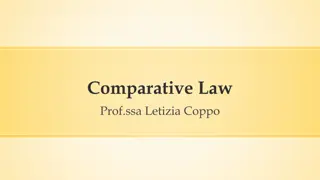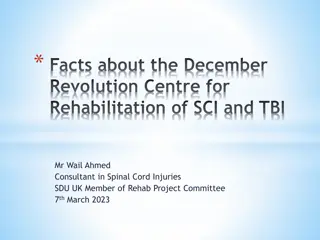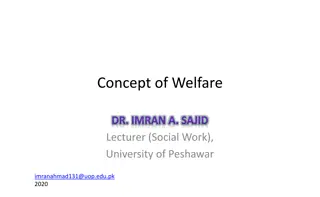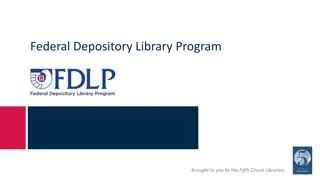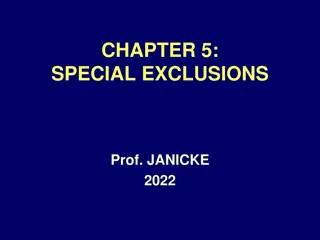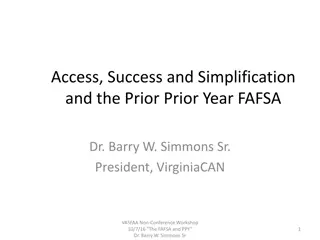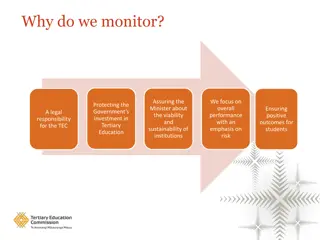Federal Character Principles in Tertiary Institutions: Implementation, Implications, Challenges
Dr. Shettima Bukar Abba Ag., Executive Chairman of the Federal Character Commission, presented a paper on the implementation, implications, and challenges of Federal Character principles in tertiary institutions at a retreat organized by the National Commission for Colleges of Education. The historical background of Federal Character evolution in Nigeria and the commitment to unity in diversity have shaped the application of these principles in governance and representation.
Download Presentation

Please find below an Image/Link to download the presentation.
The content on the website is provided AS IS for your information and personal use only. It may not be sold, licensed, or shared on other websites without obtaining consent from the author.If you encounter any issues during the download, it is possible that the publisher has removed the file from their server.
You are allowed to download the files provided on this website for personal or commercial use, subject to the condition that they are used lawfully. All files are the property of their respective owners.
The content on the website is provided AS IS for your information and personal use only. It may not be sold, licensed, or shared on other websites without obtaining consent from the author.
E N D
Presentation Transcript
FEDERAL CHARACTER PRINCIPLES: ITS IMPLEMENTATION, IMPLICATIONS AND CHALLENGES IN TERTIARY INSTITUTIONS BEING A PAPER PRESENTED BY DR. SHETTIMA BUKAR ABBA AG. EXECUTIVE CHAIRMAN FEDERAL CHARACTER COMMISSION ABUJA AT A RETREAT ORGANISED BY NATIONAL COMMISSION FOR COLLEGES OF EDUCATION FOR THE NEWLY RE-CONSTITUTED GOVERNING COUNCILS OF FEDERAL COLLEGES OF EDUCATION HELD 25THMAY, 2017 AT B.O. UKEJE CONFERENCE HALL, NCCE, ABUJA
Introduction I considered it a great honour and privilege to be invited to deliver a paper on the theme Federal Character principles; its Implementations,Implications and Challenges in Tertiary Institutions. Delighted because this is an opportunity for the Federal Character Commission as a Constitutional body to impress on those responsible for future recruitment into the Federal College of Education to have first-hand information on the need to be guided by Constitutional provisions on filling vacancies in the Federal College of Education. The idea I believe is for the appointees to be well grounded so as not run fowl of the Law. This presentation will further enhance the prospects of constructive deliberations with Federal College of Education and the Education sector which will further broaden public understanding of application of the Federal Character Principle.
HISTORICAL BACKGROUND To understand the concept of Federal Character permit me to dwell a little on the evolution of the Federation which with all intent and purpose was not only to accommodate the land mass, but was to foster harmonious conditions for cohabitation of all Nigerians. Before independence various Constitutional provisions were geared or aimed at unifying the Country as one entity. These Constitutional provisions of legislative and Executive were designed to create avenues for equal representation. When Independence was apprehension and fear of domination or sidelining within the evolving central machinery of governance by one section or the other, or one group or a combination of groups against others were palpable in the air yet the commitment to the concept of unified Nigeria was strong. The emerging class of political leaders were strong in their resolve to design principles on which to organise the Nigerian State even as they embarked on the formation of political parties to promote their several and conflicting ethnic and Sectional Interest. granted in 1960 there was
However, and quite interesting was that even under such circumstances, it is worthy of note that our leaders were unanimous in embracing the ideology of Federalism and they strenuously worked contradictions generated not only by the competition for dominance but also by the search for structural balance in the Nigerian Federation. Since independence, as pointed out earlier, our resolve to forge a united, indivisible, indissoluble nation has provided for relative compromises among competing claims as well as a delicate balance between the demands put forward by the various groups. This approach in our plural society is best captured in the description, by our founding fathers, of that Federal process as unity in diversity . Through the expression of this principle of unity in diversity, we have been able to expand the access of our various groups to the centre of engagement in the country. to resolve the nascent
The Federal Character Commission and indeed all other similar establishments face the challenge of building a much stronger and much more just political communities in which interests cross-cut, identities gradually overlap, and inter-group recognitions are based on the Principle of fair and equal access. Opportunities are provided at different levels for component units to affect protecting their identities and pursue their legitimate goals while traversing the same tracks with others. The key to the success of our nation-building is therefore the extent to which we are prepared to accommodate others and the extent to which we develop a spirit of give and take. compromises while
I must say however that the issues that created the imperatives for the establishment of the Federal Character were not peculiar to Nigeria alone. Most multi cultural, multi ethnic, multi religious and sometimes multi racial Nations of the World had always been confronted with the delicate need to accommodate imbalances in all sections for these in balances have the tendency of bringing about suspicion and conflict of alienation among various ethnic nationalities. It should be further noted that under these situations which inevitably breed instability and discord amongst the different groups, it become patently difficult for a Nation to be effectively administered for the benefit of all the people. Therefore the need for remedial measures gave birth to the Federal Character Commission.
ESTABLISHMENT OFTHE FEDERAL CHARACTER COMMISSION The Federal Character Commission is one of the fourteen (14) Independent Federal Executive Bodies established by Section 153 (1) of the 1999 Constitution. The Commission was established to give effect to section 14(3) and (4) of the Constitution which provides as follows: 14(3) The Composition of the Government of the Federation or any of its Agencies and the conduct of its affairs shall be carried out in such a manner as to reflect the Federal Character of Nigeria and the need to promote national unity and also command loyalty,thereby ensuring that there shall be no predominance of persons from a few states or from a few ethnic or other sectional group in that Government or in any of its agencies. 14(4) The composition of the government of a state,a Local Government Council, or any of the agencies of such Government or council, and the conduct of the affairs of the Government or council or such agencies shall be carried out in such manner as to recognize the diversity of the people within its area of authority and the need to promote sense of belonging and the loyalty among all the peoples of the federation.
The embodiment of this provision, Ladies and gentlemen is to promote the unity of the country. This is encapsulated through the functions the Commission is to perform which include. The functions of the Commission amongst others are: i. To work out an equitable formula for the distribution of all cadres of posts in the civil and public services of the Federation and of the states,the Armed Forces, the Nigerian Police Force and other security agencies, corporate bodies owned by the Federal or a State Government and Extra Ministerial Departments parastatals of the Federation and States; ii.To promote, monitor and enforce compliance with the Principles of proportional sharing of all bureaucratic, economic, media and political posts at all level of government; iiiTo work out an equitable formula for the distribution of socio- economic services, amenities and infrastructural facilities; modalities and scheme for redressing the problems of imbalances and reducing the fear of relative deprivation and marginalization in the Nigerian system of Federalism. iv. To take such legal measures including the prosecution of the Heads or Staff of any Ministry, Extra Ministerial Department or Agency which fails to comply with any Federal Character Principle of formula prescribed or adopted by the Commission.
The purpose of this paper therefore is to enlighten you more on the guidelines of the Commission especially as it relates to recruitment exercise. It is also a platform where issues and problems of implementation of Federal Character Principle and Guidelines could be discussed with a view to ensuring that the heterogeneous nature of the nation is reflected in the composition of the staff of all public Institutions/MDAs funded by Government, particularly the Federal Colleges of Education.
THE STRUCTUREAND ORGANS OFTHE COMMISSION The Federal Character Commission has Executive Chairman who is the Chief Executive and (37) Commissioners representing each State of Federation and FCT.The Commission operates Committee system in dealing with MDAs. All MDAs are grouped into 24 and each group is under the purview of a Committee chaired by a Commissioner selected from one of the six (6) geo-political zones. For example we have Committee on Federal Colleges of Education chaired by a Commissioner from the North-East with members from other zones. The Committee invite Chief Executives of MDAs to an interactive meeting during which they discuss issues relating to application of Federal Character Principles and guide them as appropriate. The Committee supervise, monitor, and enforce the process and procedure for employment in the respective MDAs. Under its purview the Committee Members attend interviews as monitors. The structure and various organs of the Commission enable it to enforce the Federal Character Principles. The Commission is therefore, able to effectively monitor and enforce its principles and guidelines in the employment process. No MDA will employ without receiving a Certificate of Compliance from the Commission. Any employment done without certificate of compliance renders such exercise illegal and invalid.
THE COMMISSION In effect, the powers of the Commission as an Institution can be further summarized as follows,to: a Promote, monitor and enforce compliance with the principle of proportional sharing of all bureaucratic, economic, media and political posts at all levels of government; b.Take such legal measures, including the prosecution of the head or staff of any Ministry or government body or agency which fails to comply with any Federal Character Principle or formulae prescribed or adopted by the Commission. c.Formulate and provide guidelines for Government Agencies and other employers and providers of services and socio economic amenities; POWERS AND RESPONSIBILITIES OF THE
d. Monitor compliance with the Guidelines and formulae at the Federal, State, Local government and Zonal levels in the employment and provision of socio- economic ; e.Enforce compliance with its guidelines and formulae in the areas of the provision opportunities, distribution of infrastructural facilities, socio-economic amenities and other indices; f. Demand and receive returns on employment and socio-economic indices from any enterprise or body corporate and penalize any enterprise which does not comply with a request from the Commission; g.Institute investigation into any matter relating to any institution or organization which is subject to the provisions of this EnablingAct. of employment
IMPLEMENTATTION,STRATEGIES The Commission worked out and adopted a set of guidelines and formulae for the distribution of posts in the Federal Public Service. It is important to note that the thrust of these guidelines is that the Commission is not to be used as a lever to elevate incompetent personnel or be associate with the lowering of standards by any Ministry,Department orAgency.The guiding principles state that: The indigenes of any State shall not constitute less than 2.5% or not more than 3% of the total workforce in an MDA including junior staff at the Head Office . At the Federal level, the unit of representation is the local government while the unit of representation at the local government level is the wards. Where there are only two posts, one will go to the North and the other to the South.Where there are six positions,one will be allocated to each of the six geo-political zones of the country. Where a state cannot find a candidate to fill a position, it will officially be noted and a candidate from another state in the same zone will take the position. The distribution at the zonal level states that indigenes of zone should constitute a minimum of 15% and a maximum of 18.0% depending on the number of states within each zone. It is important to highlight that the individual establishment is responsible for the selection process to determine the eligibility of the candidates.
FEDERAL CHARACTER PRINCIPLES: ITS IMPLEMENTATION, IMPLECATIONS AND CHALLENGES IN TERTIARY INSTITUTIONS The implementation of the principle of Federal Character had generally been a herculean one. In general terms, MDAs must come to terms to the effect of Constitutional provision. The Commission view the Implementation of the principle in Federal College of Education as one of the fairest because of the level of understanding and the need to attract the best Opportunities are offered by Tertiary Institutions to Nigerians that have the requisite qualifications and to an extend its meets the yearnings of the Federal Character Principle. in its teaching staff.
In the past we have cause to intervene between local communities and Management of these Institutions. There are cases of communities claiming ownership of Federal Institutions because it is located in their area. The Commission have commenced intervening in such disputes to make it known that Federal Institutions are for Nigerians, and in as much as some Nigerians are working in their locality, there are also some of their indigenes working elsewhere. In recent time, some of the tertiary Institutions were inherited/acquired by the Federal Government from States Government.
Under this arrangement majority of the initial workforce including Management staff are dominated by indigenes of the State the Institution is located. There must be a deliberate and concerted attempt to redress the imbalance overtime, as the Commission does not apply punitive measure. It is believed that with time and commitment there shall be improvement in redressing the imbalance as retirements, death and other factors set in. The overbearing influence Members on recruitment exercise temper with principle of proportion sharing. Council Members must be above board to ensure Federal Character Compliance.This engagement is now a barometer to draw attention to this anomaly. We believe no matter where board Members come from there are avenues in ensuring the principle of equity,fairness,and justice is upheld. of Board Chairmen and
Management structures have become a challenge. The Commission is worried that some Colleges of Education throw caution and every decency to the wind by having all Management staff from the same state sometime brazingly from the same local government areas council Members are to ensure that such anomaly does not occur as having Provost, Bursar, Registrar, Librarian, Director of Works from same area is tantamount to turning public Institutions to personal. The implication of Federal Character Principles in Tertiary Institutions lies in the fact that the application of Federal Character Principles does not comprise merit. Each State and the FCT is supposed to fill its slots(s) in line with the requirements set by the recruiting MDA.
Therefore the implications of application of Federal Character Principles in Tertiary Institutions are among other things that the Institutions should ensure that: A. Admission facilities are equitably shared among the Federating Units not only in terms of number of spaces but also in terms of courses (Programmes). B. Provision of not only quantitative but also qualitative education to enable each State to get qualified indigenes to fill any vacancies that might be allocated to the State/Zone. C. To ensure equitable distribution of staff among the Federating Units especially at Management level. Chief Executives of the
FEDERAL CHARACTERAND MERIT One thorny issue that have become a recurring decimal is the erroneous assertions of the position of merit under the Principle of Federal Character. Antagonists of the Federal Character Principles suspect or believe that its application undermines merit and also of the view that it robs Peter to pay Paul . This is not true because strict adherence to laid down guidelines will ensure that merit is not compromised. Instead the principle seeks to moderate the excess of the greedy to redress the shortage of the needy in the interest of national unity,security and stability. Implementing the principle of Federal character, the measures put in place to avoid compromising merit include: a.The set objectives of the organization are to be clearly stated and defined by the recruiting agency for the understanding of all;
b.Every employer of labour in the Public Service is expected to prescribe adequate job description for every position to be filled; c.Minimum standards regarding qualifications and cognate experience required for each position are to be set; d.Vacancies are to be advertised in at least two (2) newspapers circulating widely giving prospective applicants a period of six weeks within which to respond. This is aimed at attracting the best candidates from the nooks and crannies of the country; e.Only candidates who have met the prescribed minimum standards are to be short-listed for any selection process adopted by the recruitingAgency or Institution; f. Under no circumstance should an unqualified candidate be short-listed for interview purportedly on the basis of Federal Character consideration; basic educational
g.A minimum pass mark (bench mark) is to be prescribed by the recruiting Agency of Institution for the interview which should be open, transparent and competitive; h.The best and most competent candidates from each State of the Federation are to be shortlisted to compete for positions meant for their States and Zones and also select the best ones who obtained the bench mark from each State to fill the positions. i. In the letter and spirit of the Constitution (as amended) and Federal Character Act, recruiting MDAs are to invite the Commission recruitment exercises in order to ensure fairness, equity and justice as well as merit in the selection process. to monitor the
The final list of successful candidates indicating among other things, State of origin and Local Government area of each candidate are to be presented to the Commission with a request for certificate of compliance.The certificate is issued after ascertaining substantial compliance with laid down guidelines and equitable representation or rejected if there are deviations from the guidelines. The above procedures, which incorporate elements of justice, equity, fairness and competitiveness if strictly followed in any recruitment process, the likelihood of employing an unqualified or incompetent candidate is almost completely eliminated.Application of Federal Character recruitment procedures and guidelines will not only guarantee quality representation but also make merit feasible. This is because there is no part of the country that cannot produce the required candidates in any field of specialization. j.
CONCLUSION Having understood our history and the need to forge our destiny and the challenges to promote National cohesion through the instrumentality of Federal Character, the reasons why we needed fair representation cannot be overemphasised. Most of the conditions forcing us to be apprehensive and distrustful of one another fade away. The challenge facing us is to build a much more just political community in which interests cross cut, identities gradually overlap, and inter group economic interactions are based on the principle of fair and equal access. We must evolve a society in which there is confidence among our people and be our brothers keepers. This will build commonness and loyalty as we all thrive to contribute our quota in evolving an egalitarian society.Now Nigerians from all sectors are to be encouraged whenever and wherever they come from,in our quest to achieve true integration.
Ladies and gentlemen I have the feeling that overtime and with Institutions accepting our diversity our fears will ultimately disappear and we shall be one nation and Federal Characterism will be less contentious and may finally fade out. Our evolution as a nation is a pointer to this. From Empires and Kingdoms we become Protectorates, then to regions, then to one Nigeria, then to 12, 19, 21, 30 and 36 States and a Federal Capital Territory and 774 Local Governments.Nigerians co- exist in all nooks and crannies of this country engaged in fair competition of survival.
We must take advantage of this unity in diversity and teach our people to accommodate one another rather than seeing themselves as benefiting because they came from one section or the other. This is my strong view that adhering to the Principle of Federal Character particularly in the provision of employment with equity, fairness and justice is in the interest of the nation. National interest most to be informed by the needs of the populace but the provision of such needs must be balanced, equitable in the interest national unity and security. It is instructive to mention that every segment of our nation especially our Universities, Polytechnics, Colleges Communities have a responsibilities to contribute towards eradicating structural inequalities whichever form it exist. I thank you for listening. educational Institutions, Education; of
Thank you for listening Thank you for listening. .
